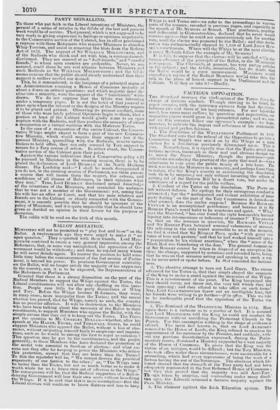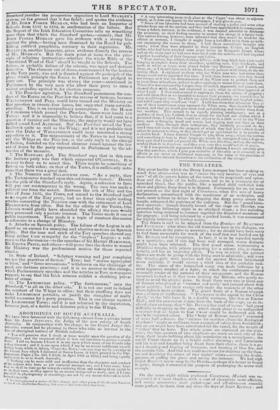FACTIOUS OPPC/SITION.
THE Ssendard resumes the vindioation of the Tories from the charge of factious conduct. Though striving to be brief, be
,
paper occupies, with the necessary extracts from last Spectator between two and three of his tong columns. For our rejoinder
much less space must suffices by quotation and requotation, our respective papers would grow in a geometrical ratio; and we can- not on this occasion follow our opponent's example : we hope, however, to indicate the import and substance of his statements with equal and perfect fairness.
I. The dissolution of the WELLINGTON Parliament in 1.311: The Stanlard says that the refusal of the Opposition to go into a Committee of Supply was seized on by the Whigs as a mere excuse for a dissolution previously determined upon. This is true. Nevertheless, it is equally true that the Tories acted from factious motives, inasmuch as their real and obvious design was to annoy the GREY Ministry, • though the pretence—quite ridiculous considering the practice of the party that used it—was a reluctance to vote away the public money at a late hour. The trick was to put the Ministers in a minority, and perhaps force them to resign, (for the King's alacrity in sanctioning the dissolutiou took. them by surprise,) not only without incurring the odium of getting rid of the Reform Bill by a direct vote, but under the semblance of a regard for the public welfare.
2. Conduct of the Tories on the dissolution. The Peers are left without defence. No apology for their outrageous conduct is attempted ; but the" undisguised and violent exhibition of mere party feeling" on the part of the Tory Commoners is denied—on what ground, does the reader suppose? Because Sir RICHARD VYVYAN is an accomplished gentleman ; and because it is Sir ROBERT PEEL'S usual habit to be courteous and quiet. " Who,' says the Standard, "has ever found the right honourable baronet lapsing into intemperance or indecency of manner ?" The answer is, that OH the occasion in question, Sir RICHARD VYVYAN and Sir ROBERT PEEL betrayed unusual vehemence of manner. On referring to the only report accessible to us at the moment, we find it stated that Sir ROBERT PEEL spoke "with great vio- lence of tone and gesture," and that he had worked himself' into a " perspiration by his violent exertions," when the " mace of the Black Rod was thundering at the door." The general demeanour of Sir ROBERT cannot be taken in disproof of an exception like this; the charge, supported by notorious and recorded facts, being, that he was on that occasion acting and speaking in such a way as lie never acted or spoke before. In that consisted the factious- ness.
3. The abortive attempt to turn out Lord GREY. The excuse advanced for the Tories is, that they simply obeyed the summons of the King to make a stand against the measures of the Whigs. This is a misstatement of the point. The King bargained that they should carry, not throw out, the very bill which they had been opposing ; and they offered to take office on such terms! Nay, Lord ELLENBOROUGH threw out an intelligible hint, that his friends were willing to go further—tin in office. This we take to be irrefragable proof that the opposition of the Tories was factious.
4. The dismissal of the MELBOURNE Ministry in 1834. Here again there is a variance as to a matter of fact. It is assumed that Lord MELBOURNE told the King he could not conduct the Government without sacrificing the Protestant Church to the Popish. For this assumption nothing in the shape of evidence is offered. The main fact known is, that on Lord ALTHORPS removal to the House of Lords, the King refused to sanction the appointment of his successor by the Premier, and suddenly, with out any previous dissatisfaction expressed, during the Parlia- mentary recess, dismissed a Ministry supported by a vast majority of the House of Commons. To prove that the King was the
victim of an intrigue, would be difficult ; but the Tory Ministers, who took office under these circumstances, were answerable for a
proceeding, which had every appearance of being the work of a faction having the ear of the Sovereign. The elections which fol- lowed showed that the strength of the Tory party had not been adequately represented in the first Reformed House of Commons ; hilt they also proved that the majority was still Anti-Tory Th oigh taken by surprise, and contending under many &sad- van ,Law, the Liberals returned a decisive majority against the PhEL Ministry.
5. The clamour against the Irish Education system. The
$tandard justifies the prospective opposition to Lord STANLEY'S System, on the ground that it has failed; and quotes the evidence of Mr. Jonsf SHER MURRAY, who had been an Inspector of Schools from 1832 to 1834, in confirmation of the failure. But the Report of the Irish Education Committee tells us something more than that which the Standard quotes,—namely, that Mr. JOHN FISHER MURRAY gave his evidence with a strong bias against the plan,—having been dismissed by the Board for pub- lishing, political pamphlets, contrary to their regulation. Mr. Sut.lavssf, another Inspector, gives evidence directly the reverse of Mr. Muattast's. But the main point at issue was the prin- ciple of religious instruction—whether the whole Bible or the "mutilated Word of God" should be taught in the Schools. The failure, or probable failure of the scheme, was apart awl distinct from this The clamour out of doors, countenanced by the leaders of the Tory party, was and is directed against the principle of the plan ; which principle the Tories in Parliament are pledged to carry out. The principle was always the same—sanctioned in Farfiament by the very men who allow their party to raise a violent prejudice against it, for election purposes. 6. The Poor-law agitation. The Standard pronounces the con-
duct of the Tories on the Poor-law the reverse of factious, because
WELLINGTON and PEEL could have turned out the Ministry on
that question in twenty-four hours, but supprted them notwith- standing. This is an extraordinary assumption. In the House of Commons which passed the Phor-law, there were barely 150
Tories: and it is impossible to believe that, if it had come to a question f turning out the Ministry, the majority would not have sallied round Lord ALTHORP. But the Poor-law suited the Tory landlords quite as well as the Whig; and it is not probable that even the Duke of WELLINGTON could have mustered a strong opposition to it. The magnanimity of the Tories in not turning out the Whigs on the Pour-law, is the only reply to the charge of faction, founded on the violent clamour raised against the law out of doors by the party represented in Parliament by the ad- reeateS of the measure.
7. The RAPHAEL plot. The Standard says that in this case the factious party was that which supported O'CONNELL. It is as easy to deny as to assert this. There might be something of faction on both sides; on that of the Tories, it is sufficiently noto- rious that there was a great deal.
S. The NORTON and MELBOURNE case. "As a party, they (the Tories) never touched upon this sad domestic history:' Herein lies the pith of the Standard's reply. Again, a reference to facts will put our contemporary in the wrong. The case was made a political one from the outset. Between the 8th of May and the 10th of June 1836, the Times, not second to the Standard itself as au organ of the Tory party, had no fewer than eight leading articles connecting the :NORTON case with the retirement of Lord MELBOURNE from office. But for the efforts of the Tories, (the Liberals would gladly have shrouded the affair,) the case would have possessed only a private interest. The Tories made it one of public importance. They made it a topic of constant discussion m reference to a change of Ministry.
9. Attacks on Spanish policy. The failure of the Legion is ad- duced as an excuse for annoying and abortive motions on Spanish policy. But the tone and spirit of the Tory speeches showed any thing rather than sympathy for the " hapless " Legion : a refe- rence to the discussions—to the speeches of Sir HENRY HARDINGE, Mr. GROVE PRICE, and others—will prove that the desire to wound the Ministry was the predominant motive for these repeated attacks.
10. State of Ireland. "Salutary warning and just complaint are nut the practices of faction." True; but "stories apocryphal or false," and "fierce accusations" withdrawn on the challenge of proof, are factious practices: and it is no answer to this charge, which Parliamentary speeches and the articles ill Tory newspapers support, to say that the Iriah returns exhibit a shocking preva- lence of crime.
11. The LYNDHURST policy. "Tile factiousness," says the Standard," is all on the other side." It is not our part to 'defend the conduct of the Whigs in office; but their shuttling does not make LYNDHURST patriotic, or justify the slaughter of really 'useful measures for a party purpose. This is our charge against the LvainnunsT Tories; and it is not rebutted by the imputation, however just, of a feeble and delusive policy to the Vhugs.



























 Previous page
Previous page